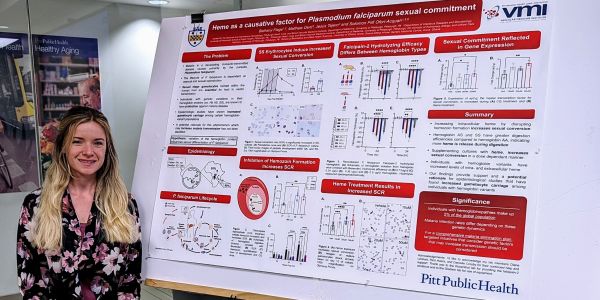
IDM student Bethany Flage won the Rosenkranz Award for the project, “Heme as a causative factor for Plasmodium falciparum sexual commitment”.
Dean’s Day is an annual student research competition. Students present their research during multiple poster sessions while faculty members judge presentations for prizes and students evaluate posters for Grand Rounds credit.
Visit publichealth.pitt.edu/deansday to learn more about the competition and see a full list of winners.
Abstract
Between 2018 and 2020, the global population experienced a 55% increase in deaths attributed to the most prominent malaria-causing pathogen, Plasmodium falciparum. Though much progress has been made in understanding the basic mechanisms of Plasmodium spp. biology, new insights are needed into the mechanisms of parasite transmission. The lifecycle of P. falciparum relies on asexual and sexual reproduction, with host to vector transmission dependent on sexual stage gametocyte formation and symptomatic disease associated with asexual parasitemia. Individuals who express variations of the hemoglobin-A (Hb A) protein are known to experience less severe malaria disease and comprise approximately 7% of the global population. Interestingly, malaria infection rates have been shown to be affected by these genetic dynamics, and multiple epidemiological studies have shown that some of these hemoglobin- variants (Hb VARs) may also positively influence the transmission stages of P. falciparum during infection. Hemoglobin degradation and the crystallization of released heme molecules by parasite enzymes are essential for parasite survival. Therefore, we sought to determine whether differential hemoglobin degradation efficiencies of certain Hb VARs impact sexual conversion rates (SCR), and thus transmission potential, of P. falciparum. We first show, in agreement with the previously stated epidemiologic studies, significantly higher transmission stage conversion, among parasites grown in Hb S containing erythrocytes (Hb S-Ery) than those differentiated in Hb A-Ery (p=0.038). Using a recombinant parasite hemoglobinase, we then found the degradation efficiency of Hb S to be significantly greater (p<0.0001) compared to Hb A, indicating heme is more readily released during the degradative process within the parasite. To determine whether directly manipulating extra and intra cellular heme concentrations affected SC, we cultured P. falciparum in heme-containing media and therapeutically inhibited the heme crystallization process with chloroquine diphosphate. We found a dose-dependent increase in SCR with the addition of heme to cultures (p<0.0001), and significant differences in SCR during therapeutic treatment (p<0.05). We conclude that heme concentration is a significant regulator of sexual differentiation in P. falciparum. As Hb S- Ery are known to contain higher concentrations of labile heme, the higher sexual conversion rates we observed are likely the result of an increase in heme concentration. These findings support further investigation into how heme concentrations may be directly manipulated to prevent commitment to gametocyte formation and ultimately disease transmission.
5/09/2022